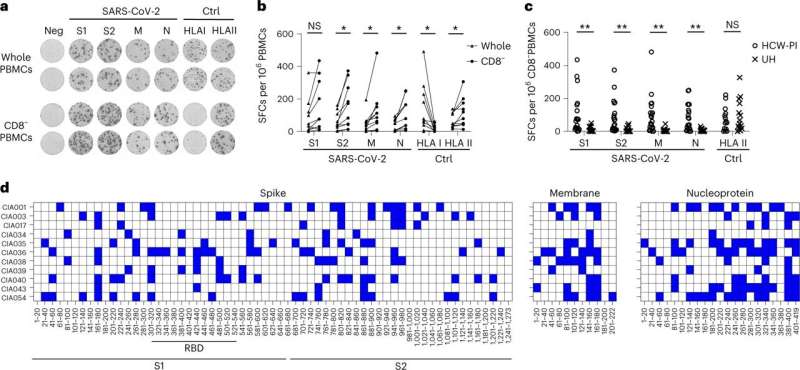Immune T cell defense is coping with COVID-19 variants of concern (for now)

Immune T cells are continuing to target the spike protein of SARS-CoV-2 variants of concern, although mutations are making some T cells less effective, according to new research.
Published in Nature Immunology, researchers from the University of Birmingham have shown that human T cell immunity is currently coping with mutations that have accumulated over time in COVID-19 variants.
In the study, the researchers tested CD4+ T cells collected at the start of the pandemic from health care workers infected with COVID-19.
Some of the T-cells were still able to recognize parts of the spike protein, called epitopes, unaltered in later virus strains including the current Omicron variant. However, T cell recognition was worse against seven out of ten epitopes mutated in different variants of concern.
The researchers caution that as SARS-CoV-2 continues to mutate, T-cell recognition of additional epitopes could be lost decreasing overall protection by the immune system.
Dr. Heather Long, Associate Professor in the Institute of Immunology and Immunotherapy at the University of Birmingham and lead author of the research said, "Our paper shows that although most people have a diverse T cell response against the virus, some responses are less effective against Omicron. As further variants of concern are identified we will need to consider carefully how new viral mutations affect T-cell recognition."
Dr. Graham Taylor, Associate Professor in the Institute of Immunology and Immunotherapy at the University of Birmingham said, "The vaccines currently in use are still vital to protect us from COVID-19. Should SARS-CoV-2 continue to mutate to evade the immune system, our findings will help researchers to develop new vaccines better suited to those variants."
More information: Heather Long et al, Mutations in SARS-CoV-2 spike protein impair epitope-specific CD4+ T cell recognition, Nature Immunology (2022). DOI: 10.1038/s41590-022-01351-7




















